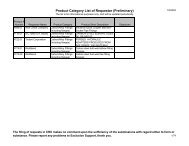and maintaining customer relationships. Electronic catalogs present far more information andoptions than their paper counterparts. Direct marketing online can shorten repurchase cycles andincrease the ability to sell additional items.Some recent business examples suggest the potential of the Internet as an efficient sales tool.Boeing’s spare parts business debuted its PART Page on the Internet in November 1996, allowingits airline customers around the world to check parts availability and pricing, order parts, andtrack the status of their orders. Less than a year later, about 50 percent of Boeing’s customersuse the Internet for 9 percent of all parts orders and a much larger percentage of customer serviceinquiries. The Boeing spare parts business processes about 20 percent more shipments per monthin 1997 than it did in 1996 with the same number of data entry people. And, because customerscan satisfy many service requests online, as many as 600 phone calls to customer servicerepresentatives are avoided each day.Cisco builds virtually all its products (routers, switches and other network interconnect devices)to order, so there are very few off-the-shelf products. Before the company established an Internetsales capability, ordering a product could be complicated. Generally, an engineer at the customersite knew what type of product was needed and how it should be configured. The engineercommunicated this information to his procurement department who then created the purchaseorder and sent it to Cisco via fax, phone or e-mail. A Cisco customer service administratorentered the order into Cisco’s system. If the order went through “clean”, it would be booked andproduction scheduled within 24 hours. Nearly one out of four orders didn’t get a “clean” bill ofhealth, however. Instead, when Cisco’s system tried to validate the order, it discovered an errorin how the product was configured. The “dirty” order would be rejected, the customer contactedand the procurement cycle would begin again.In July 1996, Cisco rolled out its Web-based ordering and configuring system. Today, that sameengineer can sit down at a PC, configure the product online, know immediately if there are anyerrors, and route the order to the procurement department. Because the customer’s pricingstructure is already programmed into the Cisco site, the authorized purchaser can complete theorder with a few keystrokes. And, rather than calling Cisco to find out the status of the order,invoice or account information, a customer with the proper authorization can access theinformation directly on the Web site. With the online pricing and configuration tools, about 98percent of the orders go through the system the first time, saving time both at Cisco and thecustomer’s site. Lead times have dropped two to three days, and customers’ productivity hasincreased an average of 20 percent per order.NEW SALES OPPORTUNITIESThe Internet operates around the clock and around the world. As a result, businesses on the Webcan reach new markets they could not reach effectively with an in-person sales force oradvertising campaigns.20
For instance, a plastics commodity specialist at a large manufacturer can sit down at his PC, clickon a Web browser and search for suppliers selling industrial plastics online. A small supplier witha limited sales force can now reach that buyer, getting its first introduction online. Similarly, avendor’s sales force may not be able to reach the millions of home offices and small offices aroundthe country. By having an online presence and creating customized services for the small businessmarket, that vendor may develop a new, lucrative market, both within the U.S. and globally.Companies using the Internet to sell products find that they attract new customers. For example,eighty percent of the consumers and half of the small businesses who purchased from Dell’s Website had never purchased from Dell before. One out of four say that if not for the Web site, theywould not have made the purchase. And, their average purchase value is higher than Dell’stypical customer.W.W. Grainger, the leading distributor of MRO supplies in North America, describes similarresults. The company launched its Web business in the spring of 1995. Today, more than 30percent of the company’s online sales are to new customers or incremental sales to existingcustomers. Because the virtual store is open seven days a week, 24 hours a day, customers whowouldn’t otherwise be able to order from a Grainger store are now able to do so. In fact, morethan 50 percent of all orders are placed after 5 PM and before 7 AM when the local store isclosed.THE FUTUREBusinesses that use the Internet to buy, sell, distribute and maintain products and services arerealizing significant cost savings and increased sales opportunities. And, the benefits only increaseas the network of businesses conducting electronic commerce grows.Investments are already taking place to realize the $300 billion in business-to-business Internetcommerce analysts predict by 2002. 52 Three of the companies discussed in this chapter—Cisco,Dell and General Electric—were responsible for about $3 billion in Internet commerce in 1997. Iftheir current projections prove accurate, these three companies alone will conduct more than $17billion in Internet commerce within three to five years. 53 The experiences of these and othercompanies are quickly spreading through the rest of U.S. industry through conferences andconsulting firms who assist companies to design and implement Internet-based business solutions.Even at $300 billion, Internet commerce will only represent 3 percent of total GDP. 54 This meansthat the greater efficiencies companies are experiencing from electronic commerce are likely tocontinue to diffuse through the U.S. economy for decades to come.Meeting legal and technical hurdlesBusinesses have raised three potential inhibitors to the widespread adoption of Internetcommerce: the lack of a predictable legal environment, concerns that governments will overtaxthe Internet, and uncertainty about the Internet’s performance, reliability and security.21
- Page 2 and 3: Frequently Asked QuestionsHow was t
- Page 6 and 7: Commissioner BiographiesDean Andal,
- Page 8: Paul Harris, Sr., Delegate, Virgini
- Page 11 and 12: Robert Novick, General Counsel,Offi
- Page 13 and 14: Stanley Sokul, Independent Consulta
- Page 15 and 16: (d) Definition of Generally Imposed
- Page 17 and 18: (D) Internet access service.--The t
- Page 19 and 20: (b) Membership.--(1) In general.--T
- Page 21 and 22: (B) an examination of the collectio
- Page 23 and 24: (iii) imposes an obligation to coll
- Page 25 and 26: (B) Exception.--Such term does not
- Page 27 and 28: (2) to accelerate the growth of ele
- Page 29 and 30: Traditional business and sales tax
- Page 31 and 32: THE EMERGING DIGITAL ECONOMYIntrodu
- Page 33 and 34: INTRODUCTIONDuring the past few yea
- Page 35 and 36: CHAPTER ONE:THE DIGITAL REVOLUTIONT
- Page 37 and 38: What makes this rise in IT’s nomi
- Page 39 and 40: Despite these impressive trends, th
- Page 41 and 42: Hundreds of new firms are starting
- Page 43 and 44: Table 3. The Race to Build Out the
- Page 46 and 47: usiness electronically with new sup
- Page 48 and 49: increased 40 percent over the previ
- Page 50 and 51: from one supplier to another. It co
- Page 54 and 55: For a business to feel comfortable
- Page 56 and 57: CHAPTER FOUR:DIGITAL DELIVERY OF GO
- Page 58 and 59: and marketing costs may become too
- Page 60 and 61: Lower sales and marketing costsIt i
- Page 62 and 63: large bank, the initial investment
- Page 64 and 65: Table 4. Internet Sales of Personal
- Page 66 and 67: For the multimedia industry, the qu
- Page 68 and 69: ook according to topic. The topic c
- Page 70 and 71: THE FUTUREAnalysts believe that Int
- Page 72 and 73: Often today, consumers are not give
- Page 74 and 75: CONVENIENCEConsumers cite convenien
- Page 76 and 77: This pattern of lower prices is not
- Page 78 and 79: CHAPTER SEVEN:WORKERS IN THE DIGITA
- Page 80 and 81: WORKFORCE FLEXIBILITYWorkforce flex
- Page 82 and 83: CHAPTER EIGHT:CHALLENGES AHEADThis
- Page 84 and 85: ENDNOTES1. “Monetary Policy Testi
- Page 86 and 87: (CERN) in Switzerland. In 1991, the
- Page 88 and 89: 34. Shankar, Bhawani. “Digital TV
- Page 90 and 91: 55. Number of Online Newspapers on
- Page 92 and 93: 78. “Internet Insurance: A Study
















